#Pericles Prince of Tyre
Text
Shakespeare Weekend
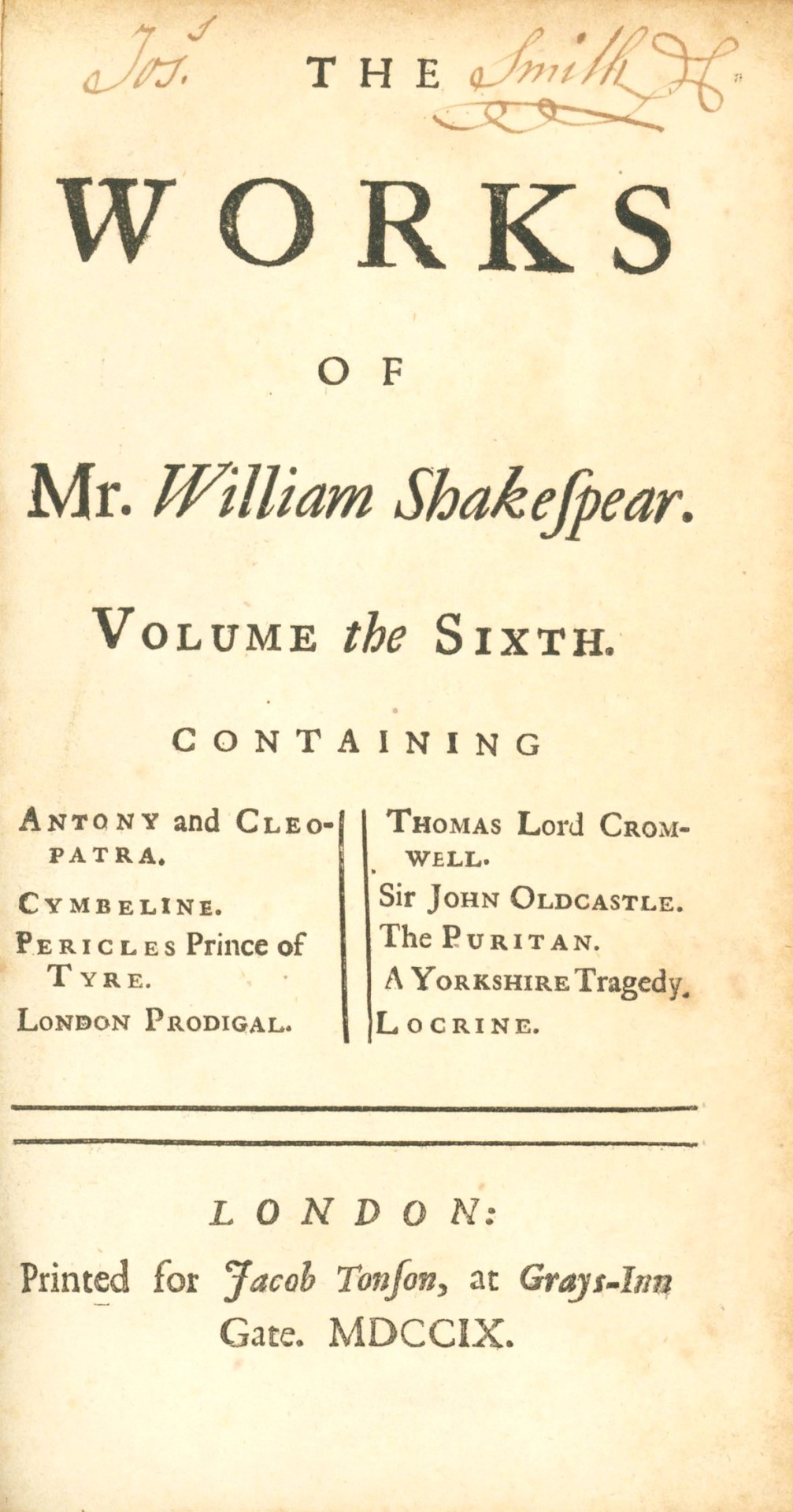


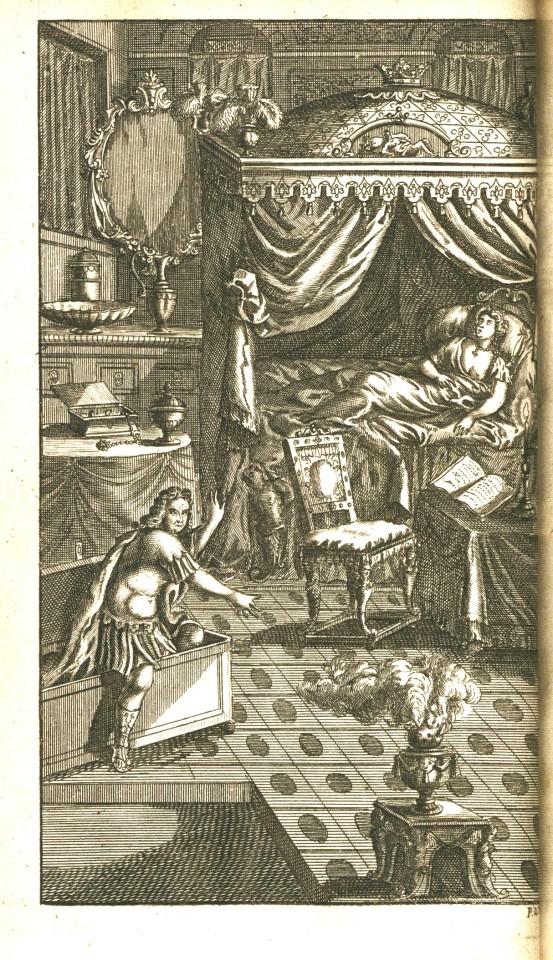
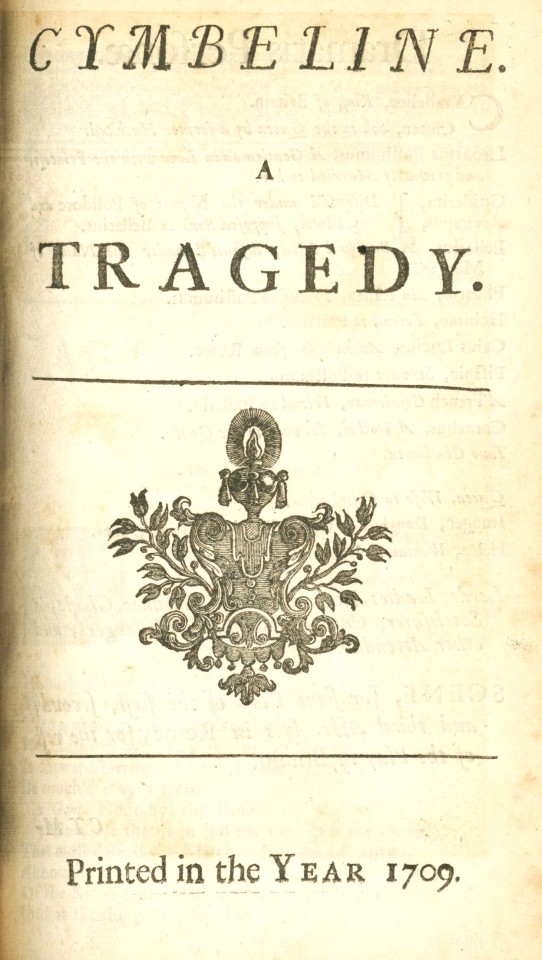
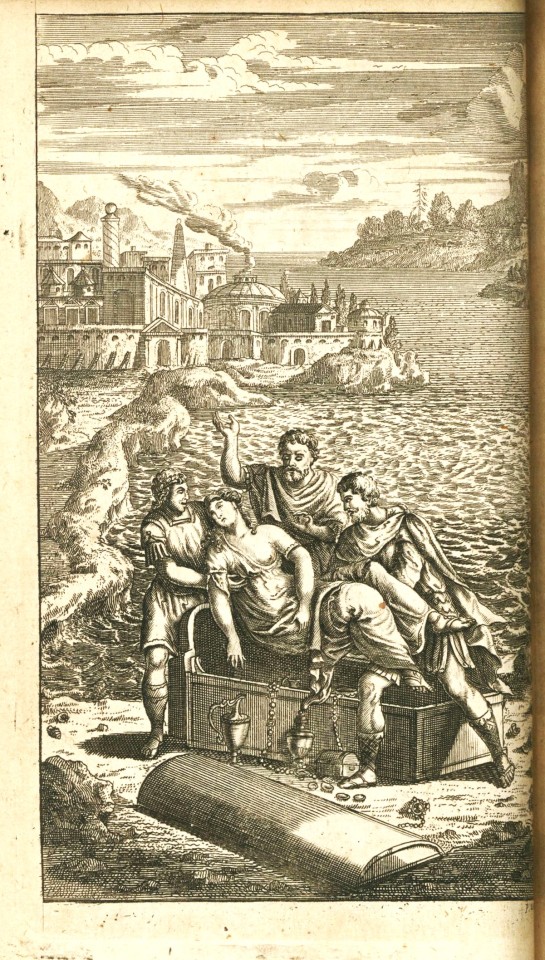
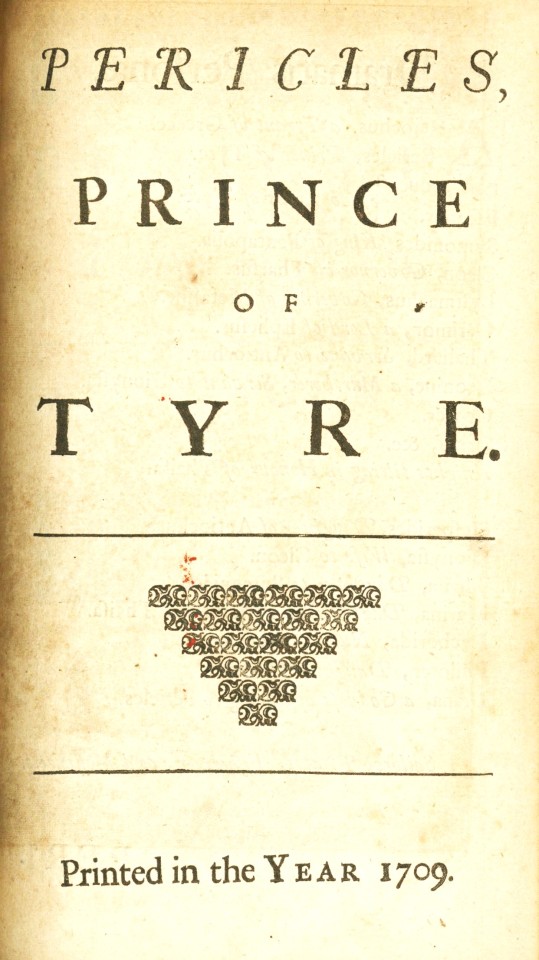

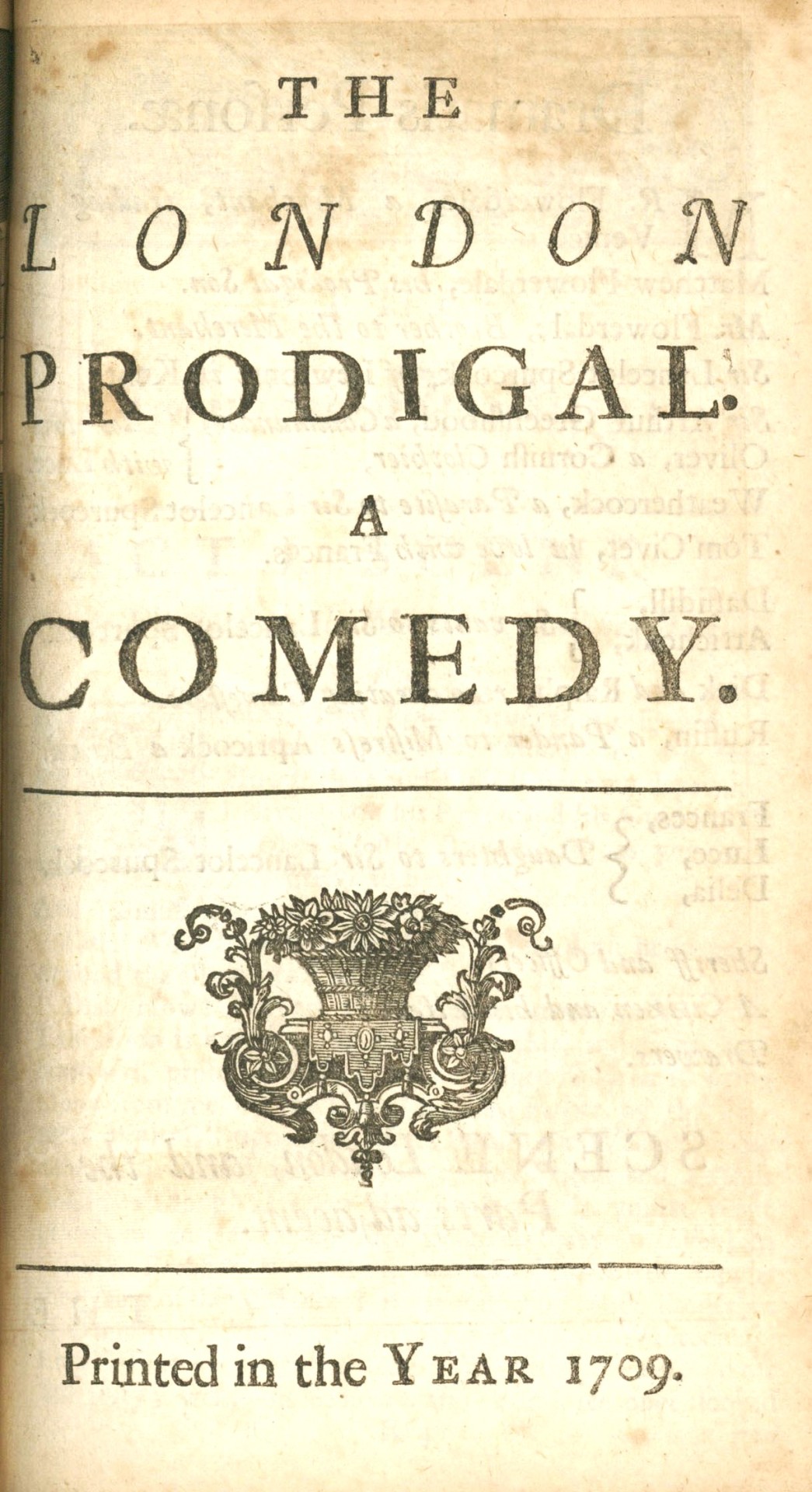

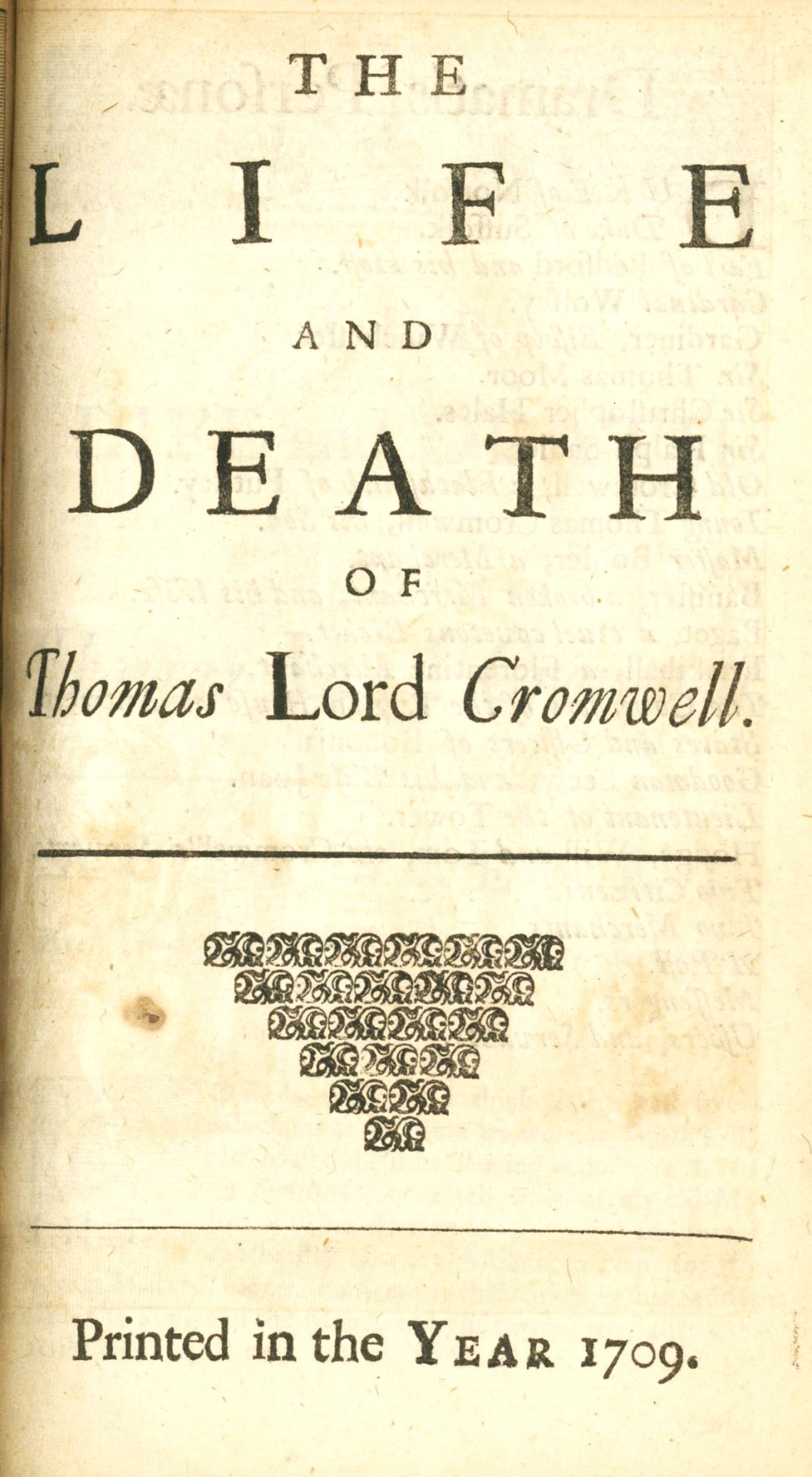
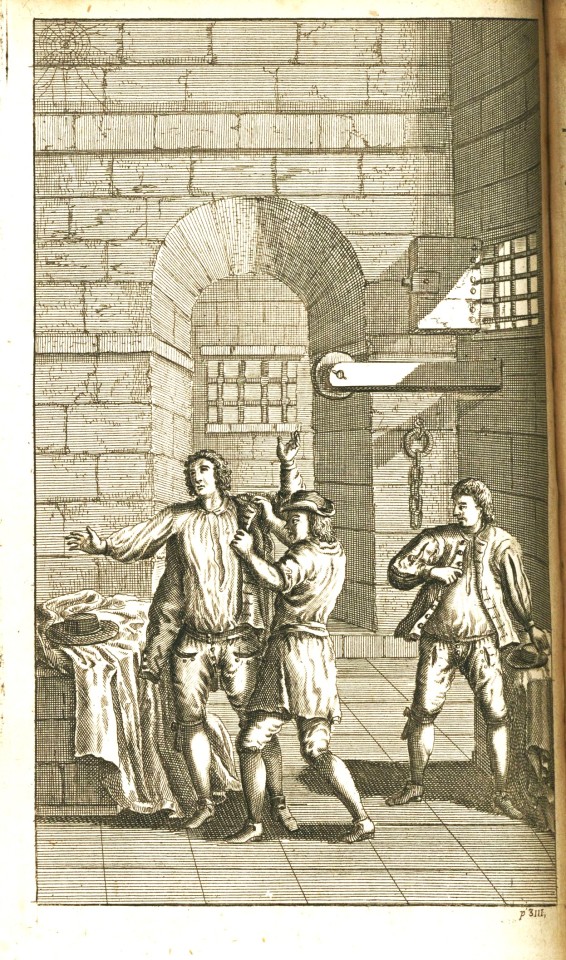

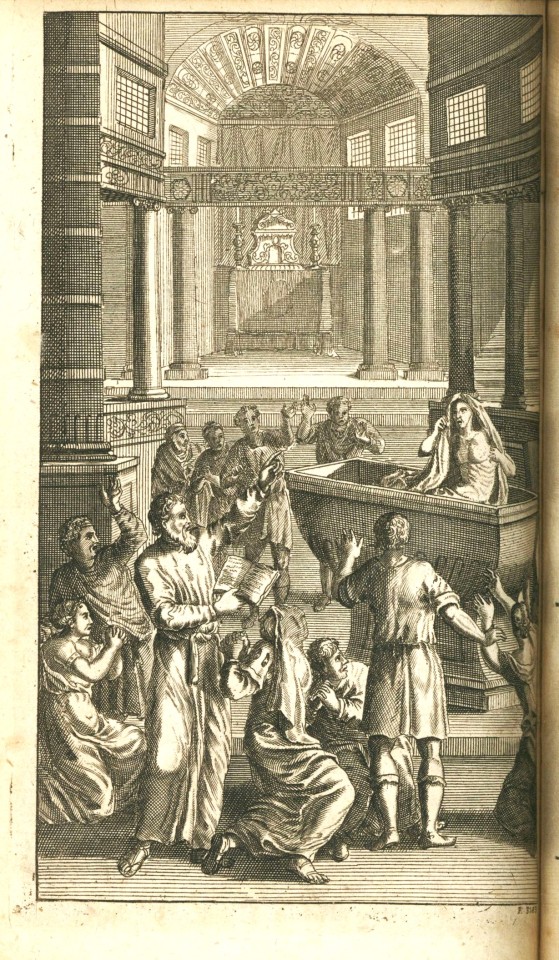





This weekend we are wrapping up Nicholas Rowe’s (1674-1718) The Work of Mr. William Shakespear; in Six Volumes. Published in London in 1709 by Jacob Tonson (1655–1736), this second edition holds an important place within Shakespearean publication history. The Work of Mr. William Shakespear; in Six Volumes is recognized as the first octavo edition, the first illustrated edition, the first critically edited edition, and the first to present a biography of the poet.
Volume six is a collection of Shakespeare’s tragedies and comedies including several plays that are a part of the Shakespeare apocrypha that bear Shakespeare’s name, but do not appear in the First Folio and of which there is question about his role in writing them. Apocrypha in the sixth volume include Pericles Prince of Tyre, London Prodigal, Thomas Lord Cromwell, Sir John Oldcastle, The Puritan, A Yorkshire Tragedy, and Locrine. Volume six also includes confirmed Shakespearean plays Antony and Cleopatra and Cymbeline.
A full-page engraving by the French Baroque artist and book illustrator François Boitard (1670-1715) and engraved by English engraver Elisha Kirkall (c.1682–1742) precedes each play. Boitard’s illustrations often place readers at the pinnacle of the plays depicting high drama in his classic Baroque style.
In addition to Rowe’s editorial decisions to divide the plays into scenes and include notes on the entrances and exits of the players, he also normalised the spelling of names and included a dramatis personae preceding each play. The only chronicled critique of Rowe’s momentous editorial endeavor is his choice in basing his text on the corrupt Fourth Folio.
View more volumes of The Works of Mr. William Shakespear; in Six Volumes here.
View more Shakespeare Weekend posts.
-Jenna, Special Collections Graduate Intern
#Shakespeare Weekend#william shakespeare#shakespeare#mr. william shakespear in six volumes#nicholas rowe#jacob tonson#Shakespeare apocrypha#apocrypha#francois boitard#elisha kirkall#antony and cleopatra#cymbeline#pericles prince of tyre#london prodigal#thomas lord cromwell#sir john oldcastle#the puritan#a yorkshire tragedy#locrine
43 notes
·
View notes
Text
Shakespeare at the end of one of his romances: And the lost princess... is returned
Me, every single time: [gasps] Oh my God the lost princess is returned
#THANK GOD SHE'S BACK!!!!!!#for the sake of not jumbling up phrasing im gonna pretend miranda is a princess. may as well be#chat#text post#shakespeare#romances#I LOVE THE ROMANCES!!!!!! THIS BLOG SUPPORTS TRAGICOMEDY#miranda#the tempest#perdita#the winter's tale#imogen#cymbeline#marina#thaisa#pericles#pericles prince of tyre#YOUR TROPES WILL NEVER TIRE ME!!!!!!! I LOVE BELIEVING IN MAGIC AND LOVE AND THE JUSTICE OF THE UNIVERSE RESETTING ALL THINGS RIGHT
11 notes
·
View notes
Note
Please tell me about your vision for Pericles
It's ENTIRELY about Marina. Idk if it'd be named Marina, Daughter of Pericles or Marina, Princess of Tyre or something else but Marina runs the show.
So Pericles went on a diplomatic mission to some other kingdoms. He wasn't on the run from the incest king or whatever and could return to his kingdom at any time. He meets his wife Thaisa, they marry, she gets pregnant and gives birth to Marina and Pericles is like "oh shit I have a kingdom to rule oh fuck" so they get on a boat to go back.
Huge storm. Absolutely massive. Completely wrecks the ship. Pericles, Marina, and Thaisa are the only ones who survive. BUT Thaisa isn't with them and is convinced that Pericles and Marina are dead and vice-versa.
Thaisa ends up in Ephesus and when the royal family (who is currently mourning the loss of their own child, who was stolen for ransom but was already gone by the time they gave the people the money) meet her she becomes the assistant to the queen there. This is because I love Twelfth Night.
Pericles washes up back in Tarsus (and the fact that he saved their kingdom is mentioned) and he's worried if he goes back to sea with Marina she'll die too so the royal family of Tarsus offer to take her in. Pericles fucks off back to Tyre.
When Marina is about five the queen of Tarsus gets jealous of Marina taking all the attention away from her own daughter (by being smarter and more likable) and so she hires her a new "tutor" who is actually an assassin.
Unfortunately for the queen, Marina is charismatic, even for a 5 year old, and the tutor just loves her. Teaches her how to fight, trains her in how to be or beat a knight, teaches her disguises and wit and pretty soon we have this 18 year old girl who is stronger than everyone and better than everyone.
The queen of Tarsus pays pirates to kill her and, being forewarned by her tutor, goes with them willingly until she convinces them to take her somewhere (she's not putting her cards on the table yet. If all the pirates die then Tarsus would know that she's alive)
They sell her to a whorehouse and once she's there she refuses to sleep with anyone. She scares the people who try to force her so badly that they swear off the whorehouse altogether. The pimps bring her to another prostitute who says that she's there willingly and Marina makes a comment about how staying there because you can't afford to leave isn't the same as being there willingly and suggests that she try saying no to the next John. She gives her a knife and we learn that she has been stealing the weapons of all the men who try to 'have' her. This other prostitute, let's call her Lysimus (yes she is the replacement for Lysimachus fuck that guy), does just that and has to defend herself agaisnt the John. When the Bawd tries to punish her, Marina protects her and threatens him that, unless they are allowed to leave, she will burn the whorehouse to the ground.
She gives the other prostitutes weapons and instruct them to "do as they please". Then she takes Lysimas off of Lesbos by dressing as a man and pretending she bought him.
(Lesbos ends up being taken over by the prostitutes and becomes a safe haven for women but we don't learn that until the end)
Pericles visits Tarsus and learns his daughter is dead. He returns to Tyre in mourning, refusing to speak. Meanwhile, Marina and Lysimus (who are implied to be in a relationship in the kind of way that takes base level media analysis, so it would get called queerbating on twitter) are traveling the world.
They end up in Ephesus where the castle is under siege. Marina takes the sword and armor of a fallen soldier and saves the day, saving the king, queen, and Thaisa. They celebrate her. Once they leave, the king and queen realize that their daughter also being named Lysimus might not be a coincidence and asks Thaisa to follow them.
Marina and Lysimus are going by ship to somewhere, doesn't really matter where. This time, when they get taken by pirates, Marina takes down the captain and takes over the ship, becoming the leader of the pirates until she learns about what's happening in Tyre.
She hears that tomorrow Tyre will be having a jousting competition to decide the new heir since Princess Marina has died. She decides that she needs to win and gives her first mate control of the ship after he takes Marina and Lysimus to Tyre.
Marina pretends to be a man to get into the competition, using armor that she'd found in the water when she was a pirate captain. Just before the last round (is that how jousing works?) Pericles' assistand asks who she is. She does the good old 'taking off the helmet' thing and announces that she is "Marina, Princess of Tyre, here to reclaim my birthright"
She wins obv and Pericles speaks for the first time in like a year to greet his daughter and it's adorable until a spy for Marina says that she and Lysimus had been getting followed and that the woman who has been tracking them is in Tyre.
It's Thaisa. Marina, Pericles, and her reunite and then she tells Lysimus that she may be princess of Ephesus and the four of them go to Ephesus. A priestess confirms that they are family and Marina and Lysimus decide that, when they are the leaders of the countries, they will be uniting their kingdoms (obvious metaphor for marriage that would also get called queerbating).
Story ends there with everyone finding out the fates of the other kingdoms. Lesbos is thriving under the leadership of the former prostitutes and the royal family of Tarsus was killed by pirates and the princess (who never did anything wrong) has taken over and she and Marina still see each other as sisters. All's well that ends well.
#thanks for the ask!#a#pericles#pericles prince of tyre#shakespeare#william shakespeare#my beloved william!!!! hail!!!!
11 notes
·
View notes
Note
hey there!! super thank you for your masterpost, it's amazing. I wanted to know if you (or maybe your followers?) have a lead on the Stratford festival's Pericles? My old acting professor had a DVD she bought when she saw it, but I can't locate it for the life of me. Many thanks!
I can't seem to find it...
However take this school play as a token of my apology, and the BBC one while we're at it, and why not the 2015 too.
7 notes
·
View notes
Text
pericles: it’s like measure for measure, but worse; the tempest, but worse; and comedy of errors, but worse!
4 notes
·
View notes
Text
3/16/2024-3/20/24: Pericles, Prince of Tyre
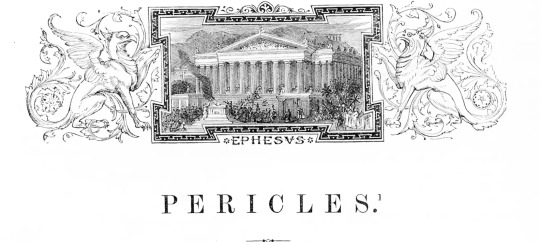
I want to say what an odd play this is. But I just watched Poor Things, and the standards of weirdness have really changed over the past 400 years.
What stood out to me as I read Pericles was that the author (or authors, as I buy the argument that the first two acts were by someone other than Shakespeare) is pushing against the limitations of the form. The stages of the day had minimal set dressing and costuming, right? That's why in Julius Caesar, there's a reference to a doublet. So when the scene moves, it has to be conveyed in dialogue or through a stage convention like "Everyone holding up torches means that it's night."
But Pericles takes fourteen years to play out. Pericles (the man, not the play) goes all over the place, getting into multiple shipwrecks and so on. So the way they have to convey where the next scene is is by having a narrator character (Gower) just come out and say:
We left him on the sea. We there him lost,
Whence, driven before the winds, he is arrived
Here where his daughter dwells, and on this coast
Suppose him now at anchor. The city strived
God Neptune's annual feast to keep, from whence
Lysimachus our Tyrian ship espies,
His banners sable, trimmed with rich expense;
And to him in his barge with fervour hies.
In your supposing once more put your sight;
Of heavy Pericles, think this his barque,
Where what is done in action, more if might
Shall be discovered. Please you sit and hark.
See, because they weren't yet making the stage actually look like a ship with banners sable and so forth, they had to essentially have the voiceover explain what the audience should be seeing. This is after Gower has covered a lot of the plot that also wouldn't fit on stage.
Earlier, it's even more direct:
GOWER Patience then,
And think you now are all in Mytilene.
Shakespeare just wants a caption to appear on screen, telling people where they are. Sadly for him, the technology won't be invented for quite some time. And I guess the audiences weren't ready for lines like "Well, here we are in Myteline" every other scene. It's a very sweeping story, and I don't think it quite fits into the strictures of Jacobean theatre.
Also, about those shipwrecks...Shakespeare sure does love shipwrecks, huh? Pericles survives two in this play, and in one we have the classic bit where people are separated and both assume the other is dead until they miraculously reunite in the fifth act. Already saw that in both The Comedy of Errors AND Twelfth Night! And I haven't even reached The Tempest yet.
I guess by my metric this is a Tragedy, since the play is named after a character in it. And Pericles goes through an awful lot of hardships, but he does end up okay at the end.
Finally, I would like to say that if you are sleeping with your daughter (like Antiochus at the beginning of the play) and making suitors answer riddles for the chance to woo her...maybe don't make the riddle be so transparently about the fact that you're sleeping with your daughter. That was bound to blow up in his face eventually.
Next up: Coriolanus
0 notes
Text
Fun facts about the name 'Flapjack':
In the US, especially the Southern areas, Flapjack is term for Pancakes but however in UK, it's entirely different food which its Chewy Bar made of Sugar, Honey and Oats, it's like Granola Bars but better.
The Word 'Flapjack' dates back to Shakespearian England from Shakespeare's play Pericles, Prince of Tyre.
"Come, thou shant go home, and we'll have flesh for holidays, fish for fasting-days, and moreo'er puddings and flap-jacks, and thou shalt be welcome." For some Reason Flapjacks was referred to as a Middle-Eastern Dish while it really is the most Common English food.
But somehow later in Act 2 Scene 1, Flapjack seem to refer to as something similar to an apple flan, idk how or why because there was no explanation.
#toh flapjack#the owl house#toh hunter#hunter#toh#the owl house season 3#flapjack#northern cardinal#Birb nooooo#respect the Pancake#pancake Birb#birbs#HES NOT DEAD#I REFUSE TO BELIEVE IT#shakespeare#Pericles#Prince of Tyre
35 notes
·
View notes
Photo

The Pendant Shakespeare proudly presents:
The complete, uninterrupted “Pericles, Prince of Tyre!”
Dramaturgy by Morgan Z. Sowell, directed by Jeff Robinson and Adam Blanford!
Available on Apple Podcasts, Google Podcasts, Stitcher, iHeartRadio, Amazon Music, Samsung Podcasts, and more!
https://podcasts.apple.com/podcast/pendant-shakespeare-aka-wild/id268841164
#Pendant#Pendant Productions#pendant audio#shakespeare#William Shakespeare#pericles#Prince Of Tyre#audio#audiobook#audio drama#internet radio#radio drama#podcast#podcasting#fiction podcast#narrative podcast#scripted podcast#voiceover#voice acting
4 notes
·
View notes
Text
i realise i never actually posted my shakespeare gay sex powerpoint here so i’m gonna share the rankings thumbsupemoji
here’s how much each shakespeare play would get improved by gay sex but WITHOUT the explanations.
10/10 (the winners)
- love’s labour’s lost
- romeo and juliet
- a midsummer night’s dream
- hamlet
- twelfth night
- troilus and cressida
- coriolanus
- the tempest
9/10
- henry vi part 3
- the merchant of venice
- julius caesar
- pericles, prince of tyre
8/10
- titus andronicus
- comedy of errors
- henry iv part 1
7/10
- the taming of the shrew
- richard ii (this is only because i saw a boring production once. im sure its actually great gay)
- henry iv part 2
- henry v
- king lear
- antony and cleopatra
- cymbeline
6/10
- henry vi part 2
- richard iii
- king john
- macbeth
5/10
- the merry wives of windsor
- as you like it
- henry viii
4/10
- henry vi part 1
3/10
- the two gentlemen of verona
- othello (im standing by this one <3)
1/10 (there are no 2/10s)
- measure for measure
- the winter’s tale
0/10
- the two noble kinsmen
-8/10
- all’s well that ends well
and an honourable mention to the much ado about nothing rank:

i am open for questions. godspeed
#shakespeare#shakespeare plays#loves labours lost#romeo and juliet#a midsummer night's dream#hamlet#twelfth night#troilus and cressida#coriolanus#the tempest#much ado about nothing#macbooth original
212 notes
·
View notes
Text
I would appreciate it if this poll is reblogged for a wider reach but you don't have to.
#shakespeare#polls#much ado about nothing#pericles#as you would like it#a midsummer night's dream#twelfth night#apparently tempest and noble kinsmen are tragicomedies but they count if you want to see them as full on tragedies#cymbeline was listed as a tragedy but is now considered as a romance or comedy so it might count for this poll idk
19 notes
·
View notes
Text
Shakespeare poll tag, for all the different genres!
82 notes
·
View notes
Text
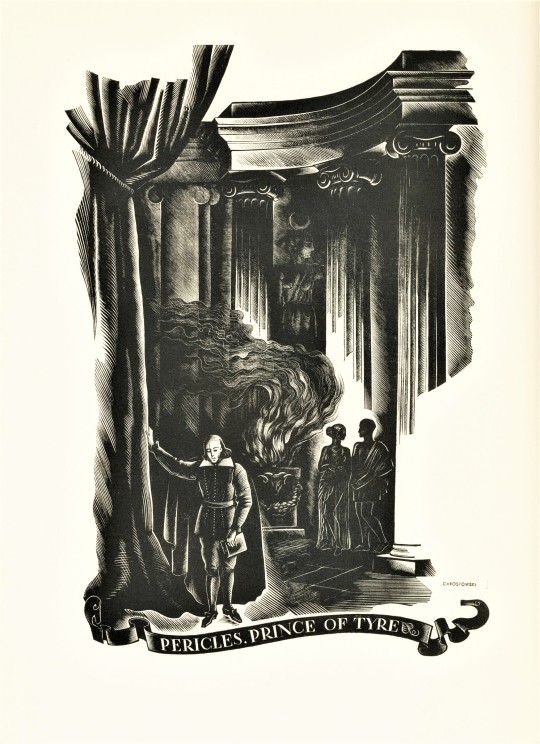
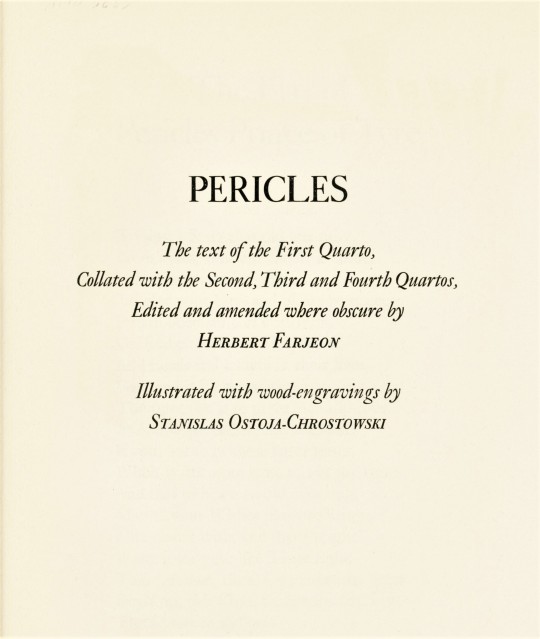

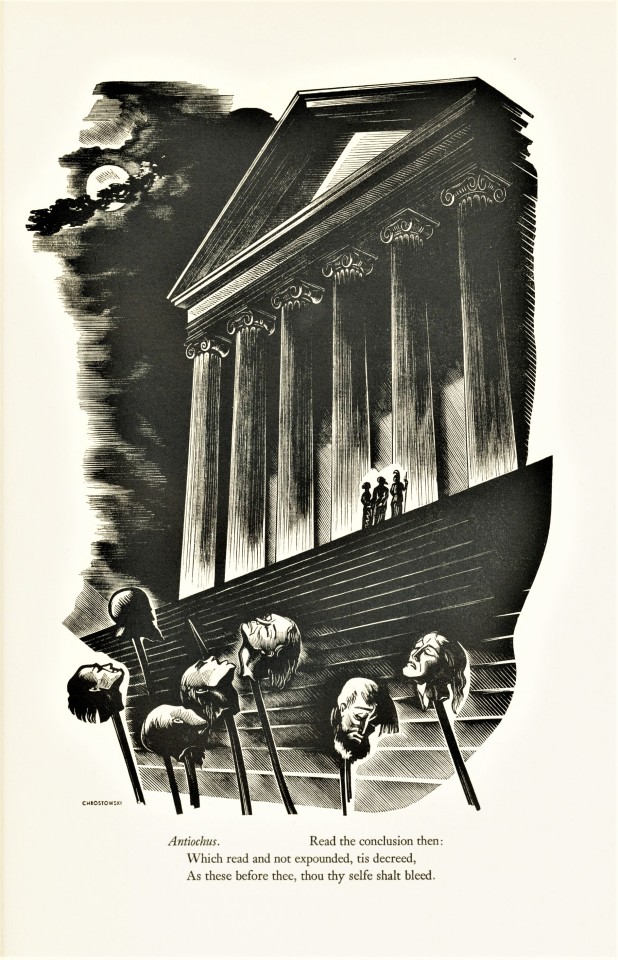
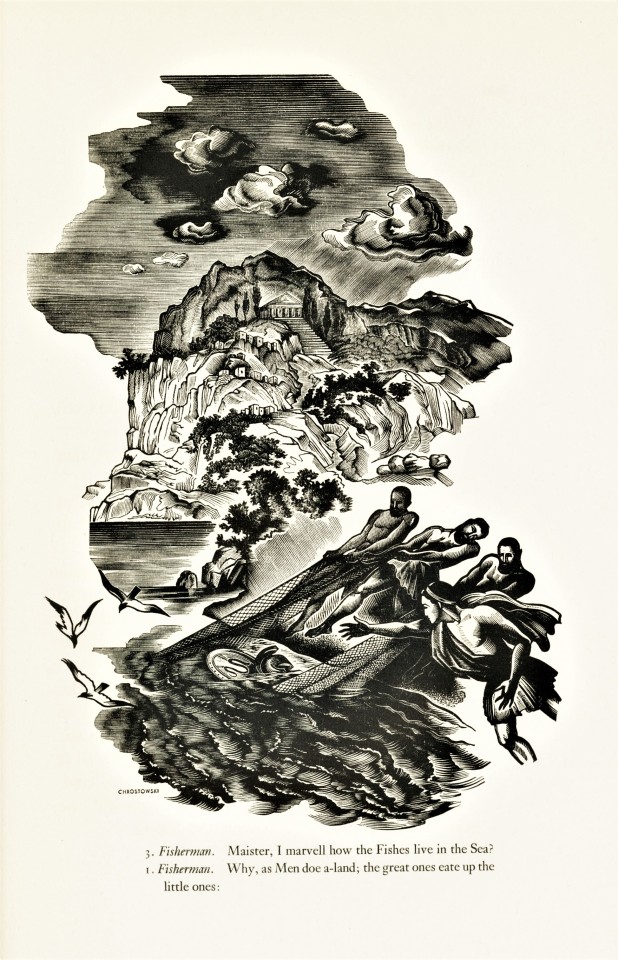
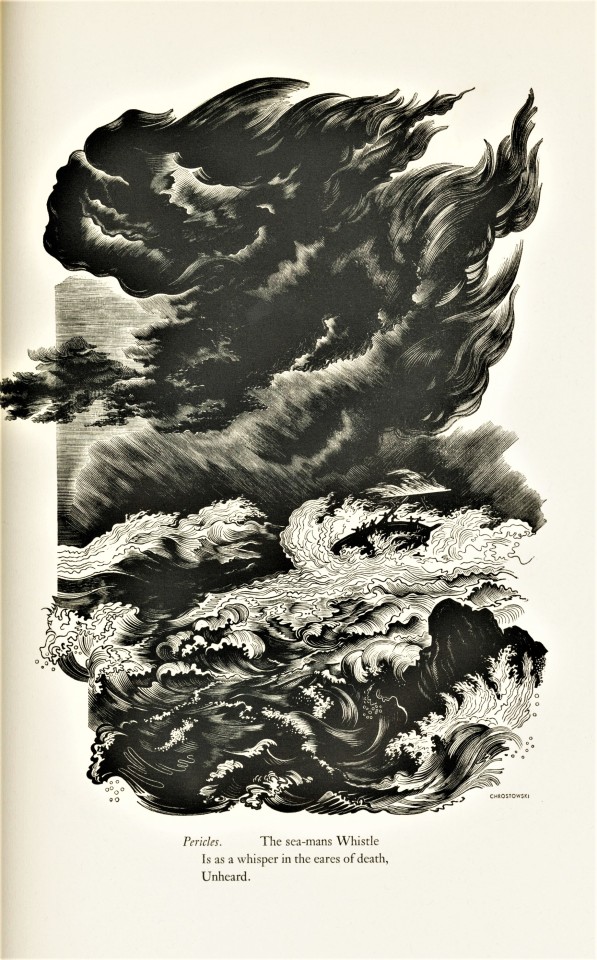
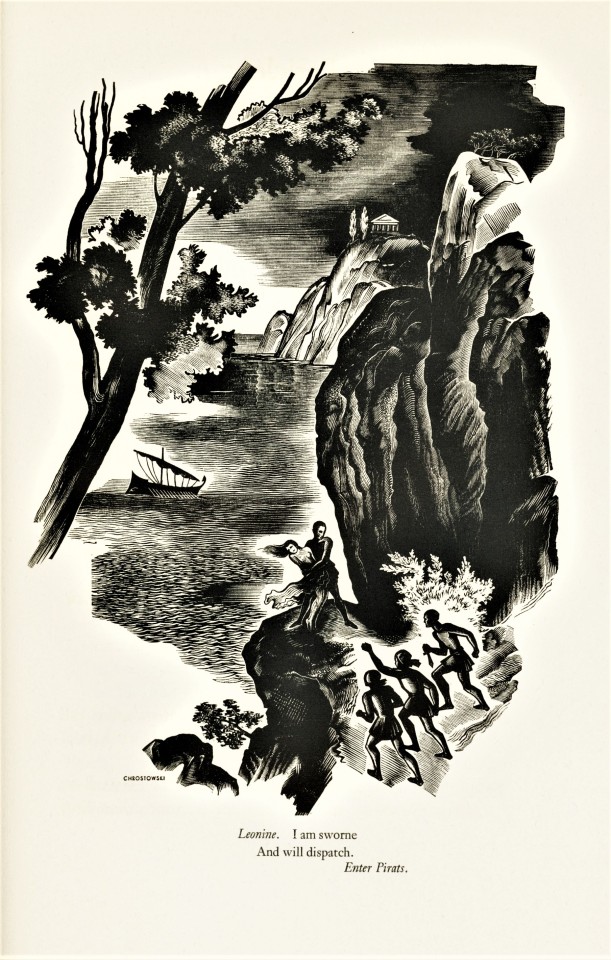
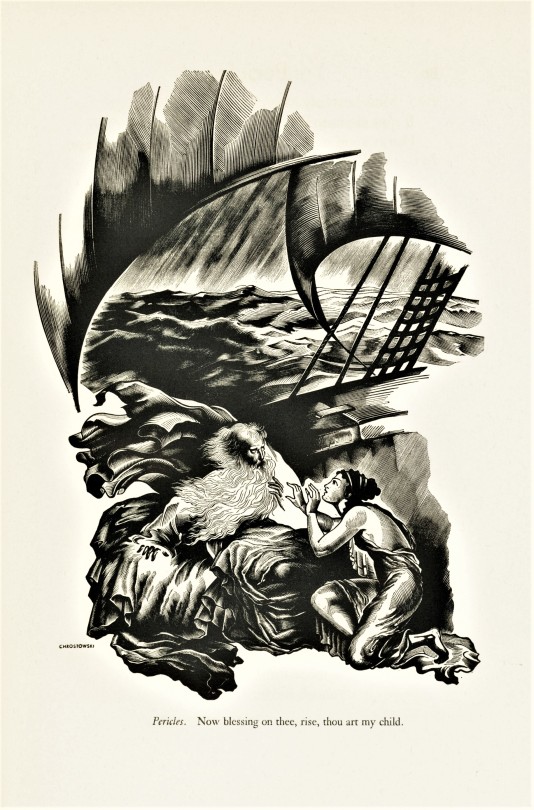
Shakespeare Weekend!
This weekend we explore Shakespeare’s romantic drama, Pericles, Prince of Tyre, the twenty-eighth volume of the thirty-seven volume The Comedies Histories & Tragedies of William Shakespeare, published by the Limited Editions Club (LEC) from 1939-1940. It is widely acknowledged that Shakespeare was likely not the sole author of Pericles, Prince of Tyre and while it was published in quarto in 1609 by stationer Henry Gosson with Shakespeare’s name on the title page, it was not included in his works until the Third Folio of 1663. Most scholars believe that Pericles, Prince of Tyre was written in 1607 or early 1608 and co-authored by pamphleteer George Wilkins.
This edition of Pericles, Prince of Tyre was illustrated with wood-engravings by Polish artist Stanislas Ostoja-Chrostowski (1900-1947). Chrostowski studied at the Warsaw Academy of Fine Arts, received a bronze medal in the 1936 Summer Olympics Art Competition for commercial graphic art painting, and was active in the intelligence department of the World War II Polish resistance movement Home Army. He was regarded as the leading wood-engraver of his nation and was known for illustrating several Polish classics and numerous children’s books. The LEC writes of Chrostowski’s work that “whole textures are created by his tools, and the resulting prints seem to have more color than just the color of black ink.” Indeed, his precise and vivid engravings storm off the page to match the dramatic tenor of the play.
The volume was printed in an edition of 1950 copies at the Press of A. Colish. Each of the LEC volumes of Shakespeare’s works are illustrated by a different artist, but the unifying factor is that all volumes were designed by famed book and type designer Bruce Rogers and edited by the British theatre professional and Shakespeare specialist Herbert Farjeon. Our copy is number 1113, the number for long-standing LEC member Austin Fredric Lutter of Waukesha, Wisconsin.
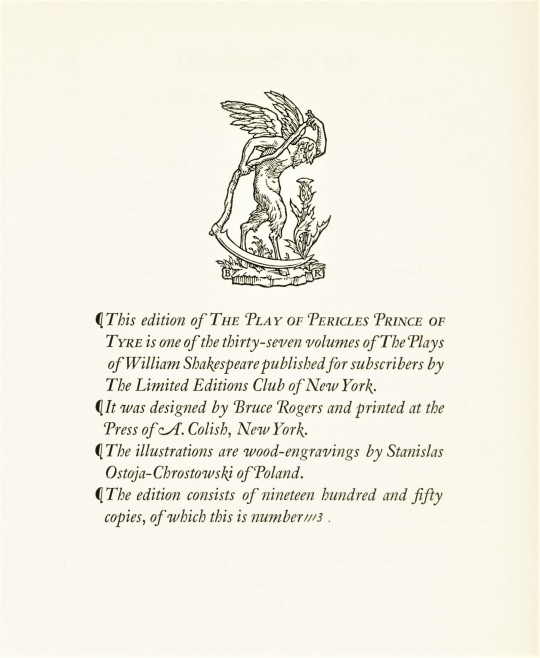
View more Limited Edition Club posts.
View more Shakespeare Weekend posts.
View more posts with wood engravings!
-Jenna, Special Collections Graduate Intern
#Shakespeare Weekend#William Shakespeare#Pericles Prince of Tyre#Stanislas Ostoja Chrostowski#LEC#Limited Editions Club#Press of A. Colish#Bruce Rogers#Herbert Farjeon#Wood Engraving#wood engravers#severed heads
26 notes
·
View notes
Text

Nora Gregor, February 3, 1901 – January 20, 1949.
1937 production of Pericles, Prince of Tyre at the Burgtheater in Vienna.
15 notes
·
View notes
Text
Shakespeare Tourney: Round 1
(summaries from shakespeare.org.uk; further summaries and propaganda encouraged)
King John: France thinks that Arthur should be king; they fight; France thinks that Louis should be king; they fight; Henry becomes king.
Pericles: Pericles is shipwrecked and finds his wife; he is shipwrecked again and loses his wife and daughter; they all find each other again.
7 notes
·
View notes
Text
The thing about Pericles is that it’s kind of a wild hot mess, a fair percentage of which was probably written by some guy named George Wilkins (his delightful Wikipedia page describes him as an innkeeper who was “also apparently involved in criminal activities”). But as Avengers: Endgame has more recently demonstrated to the world, being a wild hot mess doesn’t stop you from being popular — and the story of the adventures of Pericles, Prince of Tyre, despite being pretty scattershot, was and is popular. It’s early Jacobean England’s hottest club! It’s got everything. Incest, shipwrecks, jousting, marriage, comic relief from possibly libertarian fishermen, whorehouses, miracles, pirates.
7 notes
·
View notes
Text
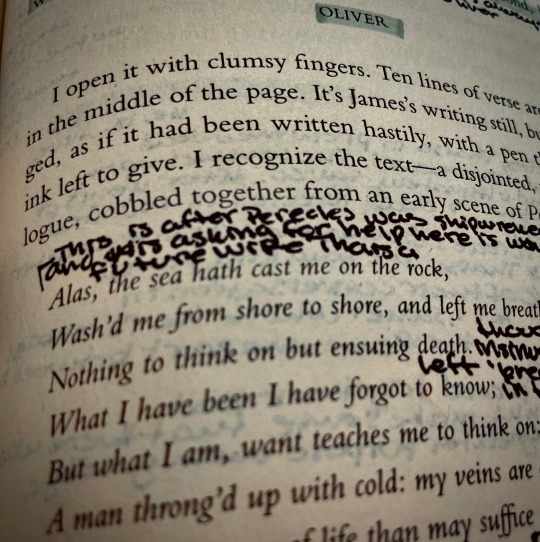
Hello tumblr, here is my argument for why James is still alive at the end of IWWV:
So I’ll start with James’s last words to Oliver when asked where he is going: “Hell. Del Norte. Nowhere. I don’t know.”
It can be presumed that when he says Hell, he means death (he almost certainly would believe he was going to Hell after he died). “Nowhere” could also be a reference to what might happen after death: absolute oblivion. Del Norte is a seemingly obscure answer (until later), but nevertheless, it is a physical place James could travel to. So he basically has two options: death or Del Norte, and his “I don’t know” solidifies that he has yet to make up his mind.
***
Fast forward to when Oliver receives James’s letter containing this passage:
Alas, the sea hath cast me on the rock,
Wash’d me from shore to shore, and left me breath
Nothing to think on but ensuing death.
What I have been I have forgot to know;
But what I am, what teaches me to think on:
A man throng’d up with cold: my veins are chill,
And have no more life than may suffice
To give my tongue that heat to ask your help;
Which if you shall refuse, when I am dead,
For that I am a man, pray see me buried.
Oliver recalls that James had recited this passage while they were on the beach together in Del Norte. *So James’s earlier comment about Del Norte was not random* This seems to confirm that James ultimately decided to go to Del Norte after he left Oliver (and did not drowned himself). Why else would he have brought up Del Norte in his goodbye AND include this relevant passage?
***
Furthermore, the passage contains more proof that James is alive.
On first glance, the diction in the passage seems to point towards James’s death; “Alas, the sea hath cast me on the rock, / Wash’d me from shore to shore, and left me breath / Nothing to think on but ensuing death... A man throng’d up with cold: my veins are chill, / And have no more life than may suffice...”
But the facade of death would be necessary should anyone other than Oliver open the letter.
***
The passage is spliced together from two lines spoken by Pericles in Pericles, Prince of Tyre Act 2, Scene 1.
He has been shipwrecked, is almost dead, and asks a group of fishermen to help him. They do, Pericles is saved from the water, and is introduced to his love, Thaisa.
Later in the play, Thaisa is presumed dead at childbirth and her body is thrown overboard a ship. Her body, however, washes up on shore, and she is revived.
At the end of the play, Pericles and Thaisa are reunited after years apart—wherein Pericles believed Thaisa to be dead—and the play ends happily.
***
This is the only play with a happy ending that has a significant role in IWWV. Throughout the book, the character’s lives have reflected the plots of the plays they are performing. Therefor, it can be inferred that James and Oliver’s lives will mirror the plot of Pericles.
It could just be coincidence that James chooses a passage from a play wherein the lovers are reunited after one has been presumed dead at sea for years... but our of everything Shakespeare ever wrote, this seems to be an odd choice for James’s final goodbye to Oliver, and, as Oliver said, “...the implications of the text and its small part in our story are impossible to ignore, too critical for a scholar as meticulous as James to overlook.”
James is trying to tell Oliver, in a way he knows only Oliver will understand, that they will be reunited and have a happy ending together.
***
I’ll also add that in Act 1, Scene 1 of IWWV—a scene wherein Oliver is actively learning a Pericles monologue—Oliver says that James would be the Cressida to his Troilus because he was the only one pretty enough. That makes James Thaisa in this story; Oliver will realize he is alive after years of thinking James was drowned.
***
Also, I can’t ignore the line, “But that is how a raggedy like ours or King Lear breaks your heart—by making you believe that the ending might still be happy, until the very last minute.”
This is what Oliver says having not yet read James’s letter—and it is certainly true of the story up until the epilogue.
IWWV is all about subverting and challenging the structure of Shakespearean tragedy, though. Therefor, it makes sense that this story would make you think it’s a tragedy, until the very last minute. This is the only way the final page and that quote work together.
***
So there you have it. James is alive and living as a recluse in Del Norte, waiting for Oliver to come and save him.
#iwwv quotes#english literature#literary#literature#if we were villains#quotes#shakespeare#william shakespeare#james and oliver#the secret history#dark acamedia#dark academism#iwwv#donna tartt#richard papen#meredith dardenne#alexander vass#wren stirling#m. l. rio#ml rio#filippa kosta#richard stirling#james farrow#oliver marks#literary analysis#analysis#romeo and juliet
178 notes
·
View notes